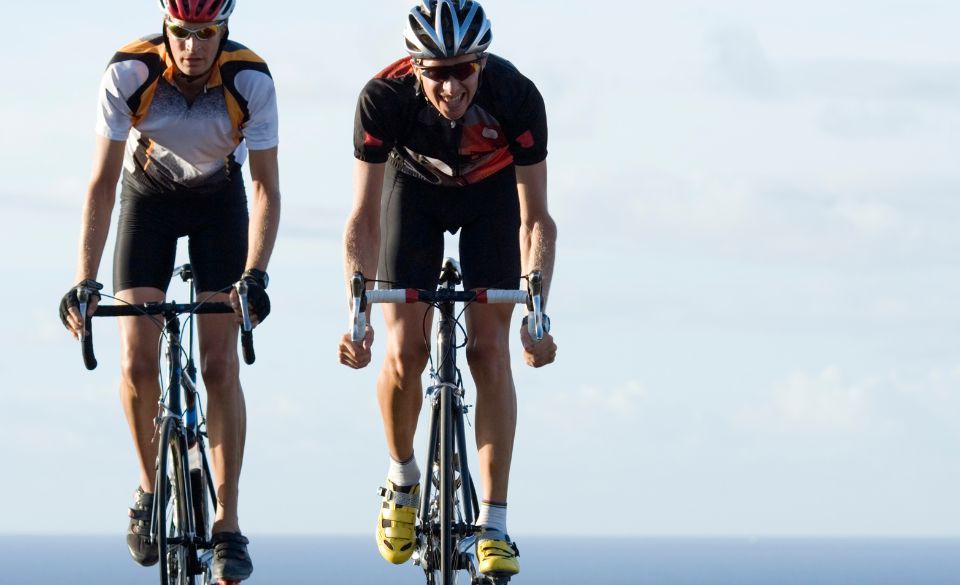
10 Ways How Cycling Can Add Years to Your Life
Page Contents
- 1. Cycling and Cardiovascular Health: Prolonging Your Heart’s Lifespan
- 2. Weight Management and Longevity: Shedding Pounds and Adding Years
- 3. Mental Well-being and Longevity: Pedal Your Way to a Happier Life
- 4. Social Connections and Longevity: Building a Network of Support
- 5. Cycling and Longevity: A Boost to Immune Function
- 6. Cycling and Cognitive Health: Pedaling Towards a Sharper Mind
- 7. Cycling and Environmental Sustainability: A Longer Life for the Planet
- 8. Cycling and Stress Reduction: A Path to a Calmer Life
- 9. Cycling and Bone Health: Pedaling for Stronger Bones
- 10. Cycling and Longevity: A Lifestyle for the Ages
- Final Words – How Cycling Can Add Years to Your Life
Cycling isn’t just a fun and eco-friendly mode of transportation; it’s also a powerful way to boost your longevity and overall well-being. In this article, we’ll explore the numerous ways in which cycling can add years to your life, supported by scientific studies that underscore the health benefits of this exhilarating activity.
1. Cycling and Cardiovascular Health: Prolonging Your Heart’s Lifespan
Regular cycling is a fantastic way to keep your heart healthy and functioning optimally. A study published in the “American Journal of Epidemiology” found that individuals who cycle regularly experience a 22% lower risk of developing cardiovascular diseases compared to those who don’t cycle. When you cycle, your heart gets a workout, pumping blood efficiently, and strengthening your cardiovascular system.
Cycling helps lower your blood pressure and reduce levels of LDL cholesterol (the “bad” cholesterol) while increasing levels of HDL cholesterol (the “good” cholesterol). These heart-protective effects can add years to your life by decreasing the risk of heart attacks, strokes, and other cardiovascular issues. So, when you’re pedaling down the road, know that you’re also pedaling your way towards a healthier heart and a longer life.
2. Weight Management and Longevity: Shedding Pounds and Adding Years
Maintaining a healthy weight is a key factor in extending your lifespan, and cycling can be a game-changer in this regard. Numerous studies have shown that cycling is an effective way to burn calories and shed excess pounds. In fact, a study conducted by Harvard University found that cycling at a moderate pace for just 30 minutes can burn approximately 298 calories for a person weighing 155 pounds.
By incorporating cycling into your daily routine, you not only manage your weight effectively but also reduce your risk of obesity-related diseases such as diabetes and certain types of cancer. Plus, cycling is a low-impact exercise, which means it’s easy on your joints, making it an ideal choice for individuals of all ages. So, hop on that bike and start pedaling towards a healthier weight and a longer, more active life.
3. Mental Well-being and Longevity: Pedal Your Way to a Happier Life
The benefits of cycling aren’t limited to your physical health; they extend to your mental well-being as well. Research published in the “British Journal of Sports Medicine” has shown that cycling regularly can significantly reduce the risk of developing depression and anxiety disorders. The endorphins released during cycling act as natural mood elevators, helping you feel happier and more content.
Cycling also provides an excellent opportunity to connect with nature, de-stress, and clear your mind. It’s a form of meditation on wheels, allowing you to escape from the hustle and bustle of daily life and find moments of tranquility. This stress reduction and mental clarity not only enhance your quality of life but may also contribute to a longer and more fulfilling one.
4. Social Connections and Longevity: Building a Network of Support
Cycling isn’t just a solo activity; it can also be a social one. Joining cycling groups, clubs, or simply riding with friends and family can lead to the formation of meaningful social connections. A study in the journal “PLOS ONE” found that individuals with strong social connections tend to live longer and healthier lives.
When you cycle with others, you’re not just getting exercise; you’re building a network of support and camaraderie. These social interactions can boost your mental and emotional well-being, reduce feelings of loneliness, and add a sense of purpose to your life. In the grand scheme of things, these social bonds can play a crucial role in extending your years on this beautiful planet.
5. Cycling and Longevity: A Boost to Immune Function
Your immune system is your body’s defense against illnesses, and keeping it in top shape is crucial for a long and healthy life. Engaging in regular cycling can give your immune system a significant boost. Research published in the journal “Exercise Immunology Review” suggests that moderate-intensity cycling can enhance the activity of immune cells, making your body better equipped to fight off infections and diseases.
When you pedal your way through the streets and trails, you’re not only improving your cardiovascular fitness but also strengthening your immune defenses. This means fewer sick days and more active, disease-free years to enjoy life to the fullest.
6. Cycling and Cognitive Health: Pedaling Towards a Sharper Mind
Maintaining cognitive health is essential as we age, and cycling can contribute to keeping your mind sharp and agile. Studies published in the “Journal of Alzheimer’s Disease” and “Neurology” have shown that regular physical activity, including cycling, is associated with a reduced risk of cognitive decline and neurodegenerative diseases such as Alzheimer’s.
Cycling increases blood flow to the brain, delivering essential nutrients and oxygen, which can enhance cognitive function and memory. Moreover, the mental focus required while cycling can provide a break from daily stressors and promote mental clarity. So, when you hit the road or trail on your bike, you’re not just working on your physical health; you’re also investing in a sharper, more resilient mind that can lead to a longer and more fulfilling life.
7. Cycling and Environmental Sustainability: A Longer Life for the Planet
Cycling isn’t just about adding years to your own life; it’s also about contributing to the longevity of our planet. By choosing to cycle instead of relying on fossil fuel-powered vehicles, you reduce your carbon footprint and help combat climate change. A sustainable environment benefits everyone by ensuring a habitable planet for future generations.
The positive impact of cycling on the environment extends to cleaner air, reduced traffic congestion, and less noise pollution. These factors contribute to better public health and a higher quality of life for communities around the world. In essence, your choice to cycle is a step towards a longer, healthier life for both you and the Earth.
8. Cycling and Stress Reduction: A Path to a Calmer Life
In today’s fast-paced world, stress has become a common companion for many. Fortunately, cycling can serve as your personal stress-buster. When you hop on your bike, you leave behind the pressures of daily life and immerse yourself in the present moment. The rhythmic motion of pedaling and the fresh air can have an almost meditative effect, helping you relax and unwind.
Research in the “Journal of Clinical Psychology” has shown that physical activity, such as cycling, stimulates the release of endorphins, which are natural mood lifters. Moreover, the outdoor environment often associated with cycling offers a break from the concrete jungle, allowing you to connect with nature and escape the hustle and bustle. Reduced stress levels can lead to better mental health and, in turn, contribute to a longer, more enjoyable life.
9. Cycling and Bone Health: Pedaling for Stronger Bones
As we age, maintaining strong bones becomes increasingly important. Cycling, though a low-impact exercise, can still play a role in keeping your bones healthy and reducing the risk of osteoporosis and fractures. A study in the “Journal of Aging and Physical Activity” revealed that cycling has a positive impact on bone density, particularly in the hip and spine regions.
While cycling isn’t a high-impact activity like running or weightlifting, the resistance placed on your bones during pedaling can help maintain bone mass and strength. By incorporating cycling into your fitness routine, you’re not only adding years to your life but also ensuring those years are lived with strong and resilient bones.
10. Cycling and Longevity: A Lifestyle for the Ages
Incorporating cycling into your daily life can transform it into a lifestyle that promotes longevity. Unlike short-term fitness trends, cycling is a sustainable and enjoyable activity that you can embrace for a lifetime. It’s a mode of transportation, recreation, and exercise rolled into one, making it easy to fit into your routine.
Moreover, cycling is an activity that you can adapt to your age and fitness level. Whether you’re a child learning to ride your first bike, a young adult commuting to work, or a senior enjoying leisurely rides, cycling is a versatile and inclusive pursuit that can accompany you throughout the various stages of your life.
Final Words – How Cycling Can Add Years to Your Life
In conclusion, the evidence is clear: cycling is more than just a mode of transportation or a recreational activity—it’s a powerful catalyst for adding years to your life. From bolstering cardiovascular health and managing weight to enhancing mental well-being and forging meaningful social connections, cycling offers a multitude of benefits that contribute to a longer and more vibrant life.
Scientific studies have consistently affirmed the positive impact of cycling on various facets of health and well-being, including immune function, cognitive health, stress reduction, and bone strength. Moreover, by choosing cycling as a sustainable means of transportation, you’re not only extending your own life but also contributing to the longevity of our planet.
Cycling isn’t merely a short-lived fitness trend; it’s a lifestyle that can be embraced throughout your life’s journey, adapting to your age and fitness level. So, whether you’re a novice cyclist or a seasoned rider, the pedal-powered path to a longer, healthier, and happier life awaits you. Saddle up, feel the wind in your hair, and pedal towards a future that’s not just about counting the years but making those years count.



